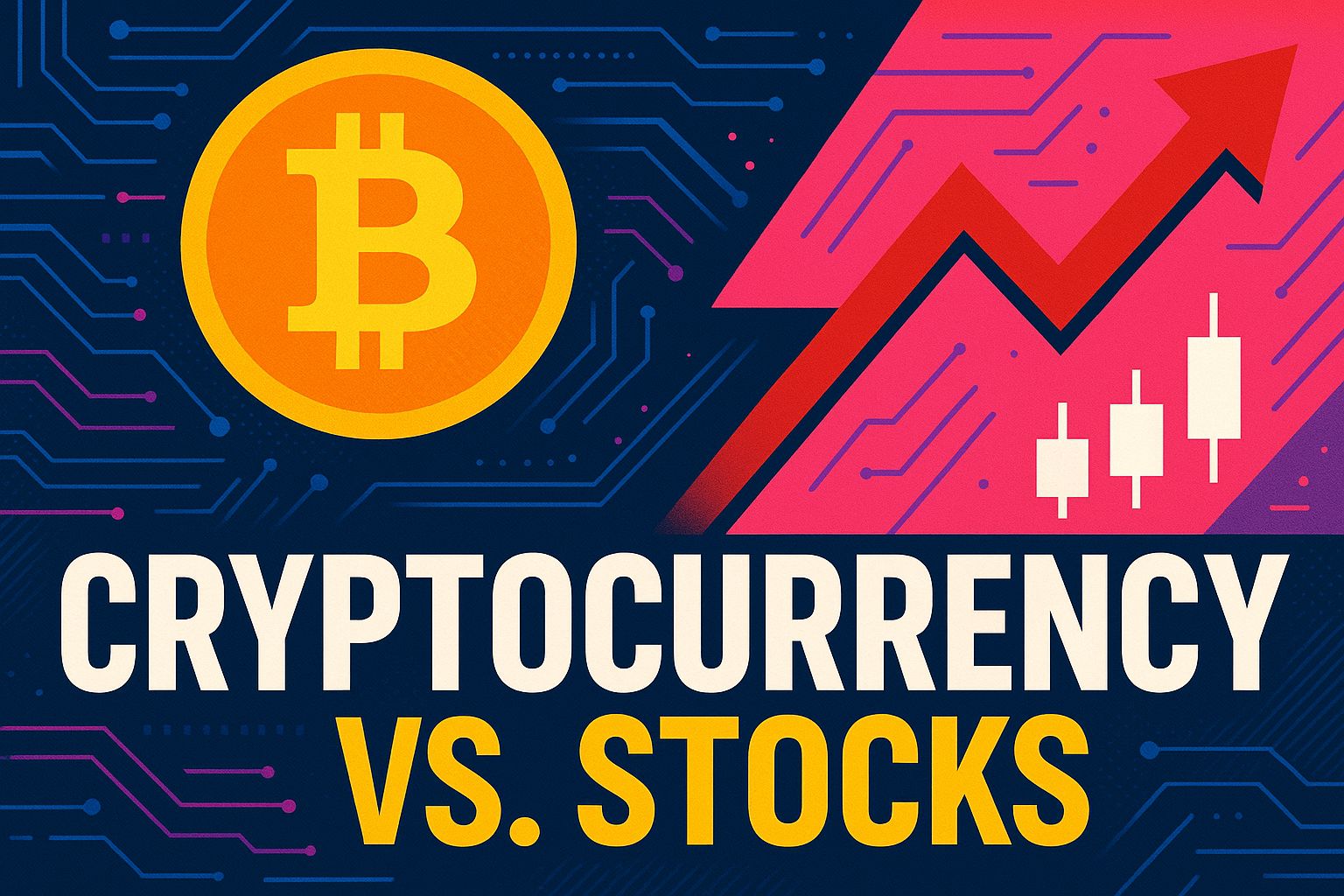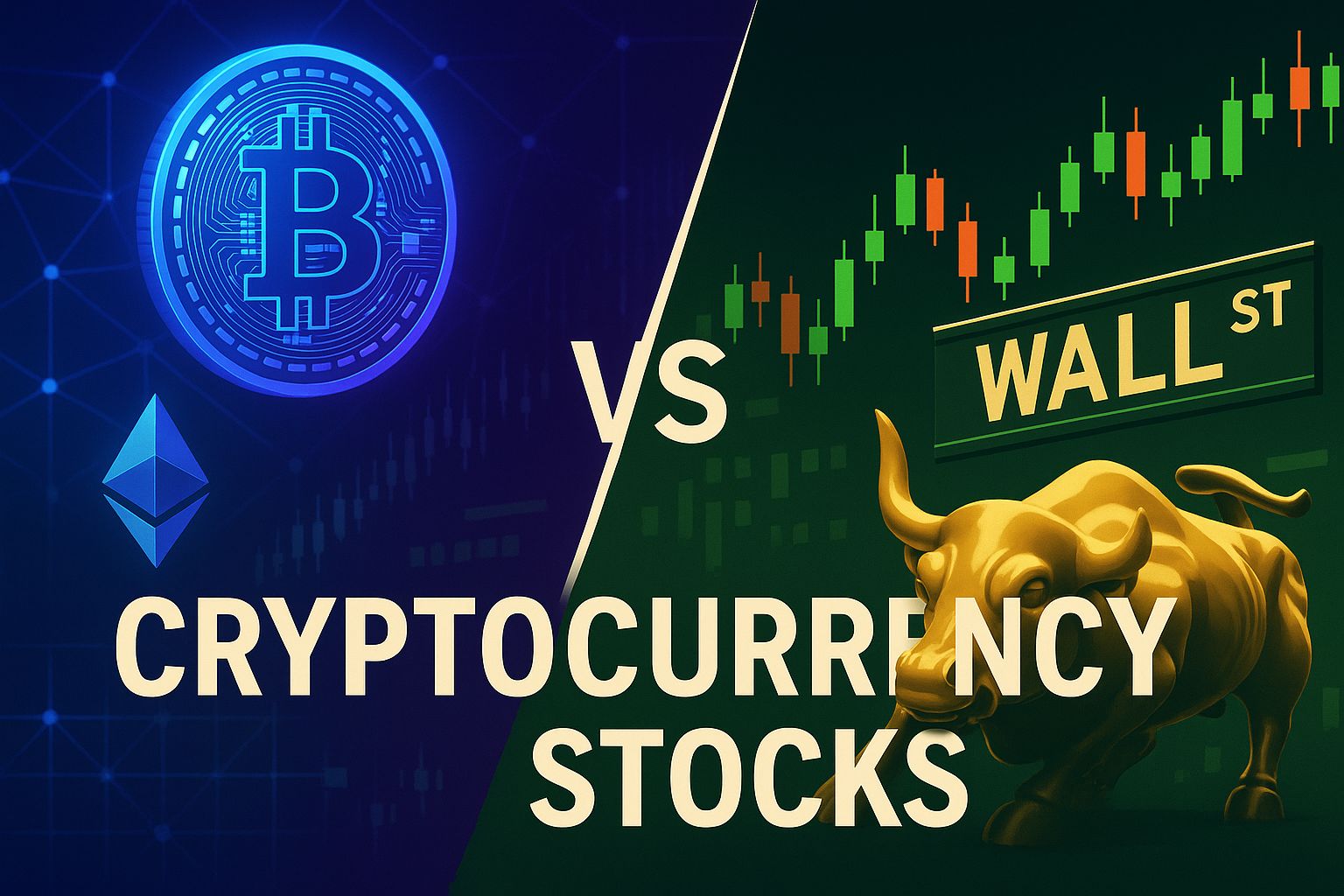Cryptocurrency vs Stocks: Which Is Better for Long-Term Growth?
Let’s be real—if you’ve ever scrolled through financial Twitter or watched YouTube investing videos, you’ve probably heard someone boldly claim that crypto is the future… only for the next guy to say stocks are the only sane choice. And honestly? Both have a point.
Choosing between cryptocurrency vs stocks isn’t just about picking sides—it’s about figuring out what makes sense for you and the life you’re building.
So, let’s dive in and break this down—without the jargon, without the hype.
Table of Contents
ToggleThe Familiar Comfort of Stocks
For most people, stocks are the first step into investing. They’ve been around forever (well, since the 1600s if we’re being precise), and they’ve stood the test of time through wars, recessions, pandemics—you name it.
If you’ve ever heard your parents or grandparents talk about “just putting it in a mutual fund and leaving it,” they weren’t wrong. The S&P 500—basically the benchmark for U.S. stocks—has historically provided an average return of about 8% over the long term. Slow and steady, but dependable.
Plus, when you invest in stocks, you’re not just throwing money into the void. You’re buying a slice of a company. If that company grows, makes money, and pays dividends, you benefit too. That’s real ownership. And for some folks, that feels safer than betting on a digital coin that swings 20% or more in a single day.
Crypto: Wild, Unpredictable, and Revolutionary
Now, crypto is a whole different thing.
It’s fast, flashy, and still figuring itself out. Bitcoin didn’t even exist before 2009, and now people are calling it “digital gold.” Ethereum took things further with smart contracts, and suddenly we had DeFi, NFTs, and a whole new financial ecosystem that doesn’t care much about banks.
Here’s the thing—crypto has made people millionaires. It’s also made people lose their shirts.
The highs are really high. The crashes? Brutal. One day you’re up 200%, and the next you’re wondering why you ever bought that meme coin named after a dog.
But there’s this feeling in the crypto space that you’re not just investing—you’re part of something bigger. You’re supporting a transformative shift in how we view money, ownership, and even the internet. And if that resonates with you, it’s hard to ignore.
Risk: The Elephant in the Room

Let’s talk about the not-so-fun part: risk.
Stocks? Sure, they drop sometimes. Remember March 2020? That was scary. But generally, if you stick it out, you recover. The market has a track record. It’s not perfect, but you’ve got decades of data showing that time smooths out the bumps.
Crypto, on the other hand, is a bit like playing in a thunderstorm. Thrilling, unpredictable, and a little dangerous. There’s no Fed to step in, no quarterly earnings calls, and barely any regulation. That could change, of course, but for now, crypto is still a high-risk game.
And yeah, regulation is coming. The only question is how strict it’ll be—and what coins or platforms might vanish when it does.
The End Goal: Do You Have One?
Here’s a question most people skip: What are you actually investing for?
Are you looking to grow wealth slowly over 30 years? Build a retirement cushion? Maybe put your kids through college?
If yes, then honestly… Stocks are kind of unbeatable in that lane. They’re not exciting, but they’re reliable. They’re the tortoise in the “tortoise and hare” story.
But let’s say you’re a bit more risk-tolerant. You don’t mind some volatility if it means a shot at 10x returns. You believe in tech, decentralization, or just want to take a chance on something bigger than yourself—then crypto might deserve a spot in your portfolio. Just not your whole portfolio.
Why Not Both?
Here’s a truth bomb: You don’t have to pick a side.
There’s no rule saying you must be all stocks or all crypto. In fact, some of the smartest investors I know are doing a bit of both. A common approach? Think of it as 90% in traditional investments (stocks, ETFs, bonds) and 10% in crypto—essentially, a small ‘moonshot’ portion.
That 10% might explode. Or it might not. Either way, your financial future doesn’t rely on it.
The Real Battle: You vs. Your Emotions

One thing nobody tells you? The toughest aspect of investing isn’t choosing assets—it’s mastering your own mindset.
When stocks drop, it’s tempting to panic. When crypto pumps, it’s tempting to FOMO in. But most gains come from not reacting emotionally.
Can you handle watching your crypto drop 60% without selling? Can you hold onto your boring index fund while your friend’s meme coin triples overnight?
If you can stay the course—whatever your strategy—you’re already ahead of the game.
The Bottom Line: Everything You Need to Understand About
Let me try to sum it up in plain English:
Stocks = slow, steady, proven. Good for most people. Great for retirement planning.
Crypto = risky, exciting, unproven long-term. Potentially life-changing—but also a gamble.
Both = a smart move if you balance your risk and don’t let hype cloud your judgment.
Key Takeaways: Your Future, Your Rules
At the end of the day, the best investment is the one that helps you sleep at night.
If you’re all about the long game, like boring-but-effective index funds and compound interest, stocks have your back. If you’re drawn to disruption, innovation, and maybe a little chaos, crypto has a place too.
Just don’t invest based on fear, hype, or what some guy on YouTube said.
Invest because you’ve thought it through—and because you believe in the story you’re writing for your future.
FAQs About Cryptocurrency vs Stocks
Yes, stocks are generally less volatile and backed by real businesses, making them safer for long-term investments than cryptocurrencies.
While some cryptocurrencies have outpaced stocks in short bursts, they carry higher risks and unpredictability over the long term.
Stocks tend to adjust with inflation over time, while cryptocurrencies respond unpredictably due to speculation and lack of fundamentals.
No. Most cryptocurrencies don’t pay dividends. Stocks often do, providing passive income over time.
It’s possible but riskier. Stocks offer compound growth, dividend reinvestment, and business equity. Crypto lacks consistent long-term models for wealth-building.
Yes. ETFs offer regulated access to crypto exposure without handling wallets or private keys, reducing security risks.
Most financial advisors view crypto as speculative. A small allocation (1–5%) in a portfolio is often recommended—not a full long-term asset substitute.
Yes. Crypto wallets are prone to hacking, scams, or key loss. Brokerage accounts are insured (like SIPC in the U.S.) and offer recovery options.
Be part of the FinanceCult community


